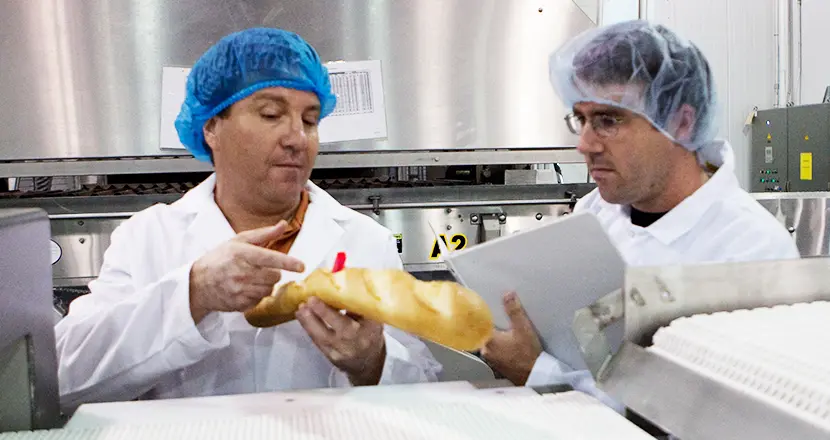Posted by Zosi Team

The role of quality assurance (QA) in food manufacturing — to ensure that all products meet the standards of safety, quality, and consistency — requires an understanding of food science-related topics (microbiology, chemistry, engineering), as well as the ability to analyze data and statistics. In addition to these technical skills, QA teams should also be able to effectively communicate and collaborate with other teams, especially the food safety team.
Something worth noting is that across many food manufacturing companies, quality assurance and food safety are often combined into a single cross-functional team, given the high degree of overlap between the two. This synergistic approach ensures that in addition to each member’s stake in their own targeted focus on the FSQA team, members across both food safety and QA will possess a richer, more thorough understanding of and appreciation for the methods and goals across both disciplines.
And specifically, within the food safety team or food safety focus of the FSQA team, quality assurance should expect to work closely with their facility’s PCQI.
PCQI Meaning
PCQI stands for Preventive Controls Qualified Individual. The PCQI is an individual who possesses the necessary training, education, and experience required to perform or oversee the preparation of an FDA-regulated facility’s food safety plan. Under the Food Safety Modernization Act (FSMA), all facilities regulated by the FDA are required to have at least one PCQI.
The PCQI does not necessarily have to be an employee of the facility, nor do they have to be part of management, but both are helpful, considering how essential the PCQI is for a robust food safety preventive controls program.
There is more than one way of becoming a Preventive Controls Qualified Individual, but the smoothest way, ensuring an optimal understanding of all relevant federal regulations, is to obtain formal PCQI training. To date, the only standardized curriculum recognized by the FDA is that of Food Safety Preventive Controls Alliance (FSPCA) for Preventive Controls for Human Food and Preventive Controls for Animal Food.
Zosi Learning — Intertek Alchemy’s online training platform for busy food safety professionals — offers formal PCQI training in the form of a blended eLearning course. This course covers all FSPCA curriculum and includes an instructor-led virtual training session.
The Role of PCQIs
The Preventive Controls Qualified Individual is responsible for preparing, or overseeing the preparation of, a food facility’s written food safety plan. The PCQI is also in charge of validating that identified hazards are controllable through established preventive controls. Additionally, they are responsible for the records review process.
A PCQI may or may not be a facility employee, and they may choose to work with multiple facilities in whatever capacity they are needed. But as is true in many instances, intimate knowledge of a facility’s processes, products, and people through regular employment can help a PCQI be much more effective in their role.
However, formal PCQI training is not the only path one can take to become a Preventive Controls Qualified Individual, as adequate job experience may also suffice under certain conditions. But with employee turnover, retirements, and other unforeseen circumstances, relying solely on the most tenured employees to fulfill this role can be risky.
Not to mention, with the myriad of federal regulations governing the development and implementation of food safety plans that there are to keep track of, formal PCQI training through an FSPCA approved training provider is the soundest approach to becoming a consistent, methodical, and all-around effective PCQI.
The Role of Quality Assurance
The role of a Quality Assurance professional in food manufacturing is to ensure that products meet the standards of safety, quality, and consistency. A range of food science and analytical methodologies, including root cause analysis (RCA) and corrective and preventive action (CAPA), are applied to effectively test, monitor, and verify various aspects of food production, such as raw materials, equipment, packaging & storing, and processes. A strong understanding of the various hazards and risks associated with food production is also critical for this role.
It is also important to note that QA professionals do not work in isolation, as they frequently interact with a variety of stakeholders, including production staff, managers, suppliers, and regulators. They also regularly work alongside various members of quality control (QC), as well as various food safety personnel. As such, the ability to communicate clearly and professionally and work constructively with others is required to successfully satisfy this role, in addition to the food science and analytical knowledge necessary to meet all safety and quality standards.
One more key skill to possess, which many argue is the most important for quality assurance, is attention to detail. From small oversights in ingredient labeling to minor fluctuations in temperature during baking, the smallest inconsistencies, if not caught, can lead to serious quality issues. Similarly, for PCQIs, attention to detail is a vital skill to possess, as the process of creating or overseeing a comprehensive food safety plan involves many moving parts and demands strong knowledge of federal regulations and recordkeeping requirements.
Whether your food safety and quality assurance teams are separate or integrated, there’s value in understanding the similarities between the two and leveraging them as often as possible to achieve all common objectives.
One more way of creating this type of synergy is by cross-training members of food safety and quality assurance in disciplines that may be applicable to both, such as risk assessment, hazard analysis, corrective action, and preventative controls.
Zosi Learning offers online training courses in these same disciplines and more, including a 20-hour blended PCQI Training Course, led by Intertek Alchemy food industry experts. Each of our online training courses offers the convenience of self-paced learning and can be completed up to six months from date of purchase.



